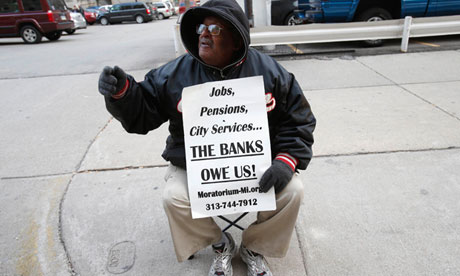This would have forced AIG into bankruptcy. However Lehman had declared bankruptcy the day before and the world was still engulfed in the aftershocks. The Bush administration and the Federal Reserve board decided that they would stop the cascade of failing financial institutions and bail out AIG. As a result, the government agreed to honor all the CDS issued by AIG and effectively became the owner of the company.
Chicago has been in the news recently because its mayor, Rahm Emanuel, seems intent on cutting the pensions that its current and retired employees have earned. Emanuel insists that the city can't afford these pensions and therefore workers and retirees will simply have to accept reduced benefits.
If the connection with AIG isn't immediately apparent, then you have to look a bit deeper. Folks may recall that AIG paid out $170m in bonuses to its employees in March 2009 with its top executives receiving bonuses in the hundreds of thousands of dollars.
These were people who not only shared responsibility for driving the company into bankruptcy; they also had been at the center of the financial web that propelled the housing bubble into ever more dangerous territory. In other words, the bonus beneficiaries were among the leading villains in the economic disaster that is still inflicting pain across the country.
The prospect of executives of a bailed-out company drawing huge bonuses at a time when the economy was shedding 600,000 jobs a month provoked outrage across the country. President Obama spoke on the issue and said that unfortunately no one in his administration was smart enough to find a way that could keep the bonuses from being paid. The problem according to Larry Summers, then the head of President Obama's National Economic Council, was that the bonuses were contractual obligations and they had to be honored.
This provides a striking contrast to what might happen to current and former city employees in Chicago and may happen to current and former employers of the states of Illinois and Detroit. In these cases, it seems that the contracts workers had with their employers may not be honored. Employees who worked decades for these governments, with part of their pay taking the form of pensions in retirement, are now being told that these governments will not follow through on their end of the contract.
The differing treatment of contracts in these situations is striking for several reasons. First, the AIG executives stood to gain much more money with their bonuses on a per-person basis. In contrast to the six-figure bonuses going to top executives, pensions for Detroit's workers average just $18,500 a year. Pensions for Chicago's workers average over $33,000 a year, but almost none of these workers will get Social Security, so this will be their whole retirement income.
In contrast to the top AIG executives, who played a role in bankrupting their company and sinking the economy, no one has accused workers in Chicago or Detroit of doing anything wrong. These were people who taught our kids, put out fires, and picked up garbage. They did their jobs.
They also might be excused for thinking that they could count on the governments involved to fulfill their end of the contract. After all, both Michigan and Illinois have provisions in their constitution stating that pensions earned by public sector workers cannot be cut. Since cities like Detroit and Chicago are creations of the state governments, workers for these cities, like workers for the state government, might have thought the state constitution protected their pensions. Apparently they should have hired lawyers who could have explained to them why this is not the case.
There is yet another connection between the plans to cut pensions and AIG. The bond-rating agencies played a prominent role in both cases. In the case of AIG meltdown, the bond-rating agencies gave investment grade ratings to trillions of dollars of mortgage backed securities (MBS). They often gave these ratings to dubious issues for the simple reason that they were being paid. As one analyst from S&P said in an e-mail, they would rate a new MBS if it "was structured by cows."
The bond-rating agencies played a similarly disastrous role in the pension problems facing state and local governments. In the stock run-up in the 1990s, they green-lighted accounting that essentially assumed that the stock bubble would continue in perpetuity, effectively growing without limit. This meant that state and local governments didn't have to contribute to their pensions since the stock bubble was doing it for them. States like Illinois and cities like Chicago clung to this habit even after the bubble burst.
There is one final noteworthy connection between AIG and the Chicago pension situation. Chicago's Mayor, Rahm Emanuel, was President Obama's chief of staff at the time that no one could figure out how to avoid paying the AIG bonuses. Apparently Emanuel has learned more about voiding contractual obligations now that it is ordinary workers at other end of the commitment.






